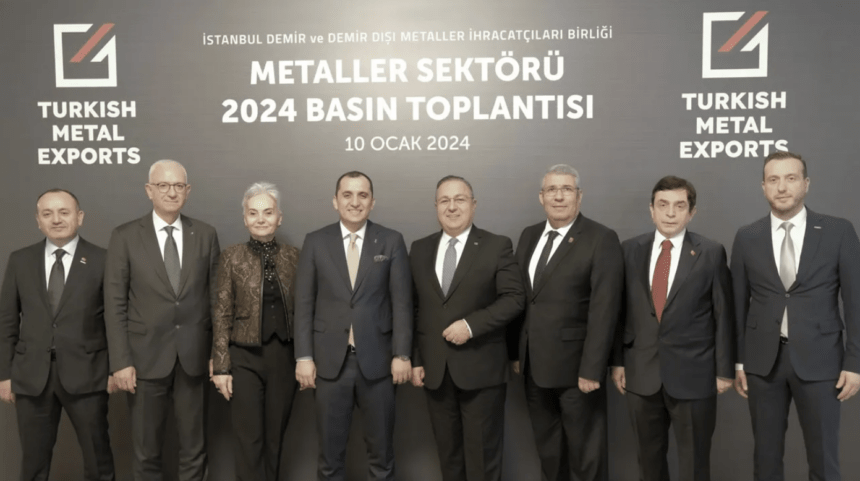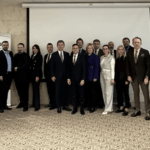The year 2023 was a lost year for the Turkish ferrous and non-ferrous metals sector, which suffered from exchange rate and cost pressures, as well as challenging conditions in global competition.
The sector’s exports decreased by 13.3 percent in value to USD 12.7 billion last year compared to the previous year, and by 10.5 percent in quantity to 2.84 million tons. Cetin Tecdelioglu, President of Istanbul Ferrous and Non-Ferrous Metals Exporters’ Association (İDDMİB), said that their target for this year is to catch the 2022 figures.
Tecdelioğlu organized a meeting with İDMMIB board members and shared the sector’s 2023 performance and 2024 targets. Pointing out that the earthquake disaster on February 6 also had a high impact on the contraction, Tecdelioglu said that the conditions for this year will not be better than last year, but that their goal is to reach USD 14 billion by the end of this year as in 2022.
Tecdelioğlu, who stated that as an association, they held more than 100 events last year, pointed out that the earthquake disaster, wars, and global developments last year caused a decrease in the value and quantity of ferrous and non-ferrous metals exports, as in every sector. “In the January-December period of 2023, the exports of our sector reached USD 12.7 billion with a decrease of 13.3 percent in value, while the quantity decreased by 10.5 percent to 2.84 million tons. In this period, the sector’s export unit price per kilogram decreased by 3 percent compared to the previous year to USD 4.47.” Tecdelioglu said.
Casting exports maintained growth
Tecdelioğlu stated that Germany ranked first in the sector’s exports last year with USD 1.66 billion, while exports to Italy, which ranked second, amounted to USD 764 million, and to the USA, which ranked third, amounted to USD 648 million. According to the information obtained, the highest export increase in this period was to Saudi Arabia with an increase of 275 percent. Exports to this country amounted to USD 185 million last year. Looking at the sub-sectors, exports amounted to USD 4.89 billion in aluminum, USD 4.03 billion in armature, USD 2.07 billion in copper, USD 5.73 billion in kitchen, USD 2.37 billion in hardware, USD 30.05 billion in construction and USD 11.33 billion in casting. The only sub-sector that was able to maintain its exports without contraction last year was casting.
Sharing the reasons for the loss of exports in 2023, Tecdelioğlu said, “We have lost our competitive power as the exchange rate level has not increased in line with inflation. Unfortunately, exchange rate policies are not in line with inflation in the face of our increasing costs and we are currently having difficulties in pursuing competitive policies. We remain high in pricing and have lost our price competitiveness. We continue to look forward to the last two quarters of 2024 with hope, as we expect our post-election government to work in parallel with inflation in exchange rate policies in the next period.” Reminding that the World Trade Organization and the World Bank’s growth forecasts for the global economy are around 2 percent for 2024, Tecdelioglu said, “Accordingly, we will actually see a contracting global economy. As exporters, we are preparing for a difficult year. It will be a year in which interest rates are high and the exchange rate increase below inflation. However, we are still trying to keep our targets high. This year, we want to increase our exports to the level of USD 14 billion, which was achieved in 2022.”
Capacities still at 50 percent in the earthquake zone
Pointing out that the effects of last year’s earthquake disaster on the metal sector were very high, Tecdelioglu said, “The population in the earthquake zone has decreased a lot. I have a facility in Malatya, but Malatya is like an abandoned city now, the population has almost halved. Even if people do not leave Malatya, they have nowhere to stay. In this environment, it is very difficult to produce and export in that region. We are still working at 50 percent capacity in the earthquake zone. Unfortunately, the negative impact of the earthquake on industry will continue in 2024. Houses are being built, but not yet at a sufficient level. We are also aware that a process is needed. Different incentives are needed for producers in earthquake provinces. After the increase of nearly 50 percent in the minimum wage, we expect incentives in the employer contribution share to institutions and organizations that still strive to produce under difficult conditions, employ workers, especially in the geography of the earthquake region.”
Sector expects a special price tariff in energy
Pointing out to high energy costs of the sector, Tecdelioglu states that the sector expects a special price tariff in energy: “We are one of the sectors with the highest electricity and natural gas consumption. Energy prices and our costs are also very high in percentage terms. For this reason, we want support in energy prices with a special tariff for the metal sector regarding energy policies.”
According to the December results of the Turkish Metal Industry Export Index “TR-METALENDEX” prepared by İDMMIB, the index closed the year with a downward trend in terms of quantity and an upward trend in terms of unit prices. According to the latest 2023 index results, demand is expected to remain sluggish in the first quarter of the new year, with markets slowing down and demand continuing to decline.










